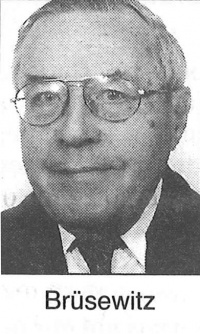If this site was useful to you, we'd be happy for a small donation. Be sure to enter "MLA donation" in the Comments box.
Brüsewitz, Carl Friedrich (1919-2008): Difference between revisions
m Brüsewitz, Carl Friedrich moved to Brüsewitz, Carl Friedrich (1919-2008): dates |
No edit summary |
||
| Line 1: | Line 1: | ||
''Mennonite Weekly Reivew'' obituary: 2008 Oct 27 p. | ''Mennonite Weekly Reivew'' obituary: 2008 Oct 27 p. 6 | ||
Birth date: 1919 | Birth date: 1919 | ||
text of obituary: | |||
<center><font size="+2">'''Dutch leader dies'''</font></center> | |||
<span style="font-variant:small-caps">'''By Alle G. Hoekema'''</span> | |||
<font size="1">Mennonite World Conference</font> | |||
ZWOLLE, the Netherlands — Carl Friedrich Brüsewitz, a leading Dutch Mennonite pastor who was imprisoned in a Nazi concentration camp, died Oct. 2. He was 89. | |||
[[Image:Brusewitz_carl_friedrich_2008.jpg|200px|right]] Brüsewitz served Mennonite World Conference as vice president for Europe from 1978 to 1984. | |||
Brüsewitz played an important role in the Dutch Mennonite church for several decades. Born and raised in The Hague, he served congregations at Balk and Utrecht from 1943 to 1965. He then worked as the head of Protestant prison chaplains in the Netherlands until his retirement in 1986. In this capacity he often negotiated with the Minister of Justice about the place of the churches in prison work. | |||
From 1971 to 1979 he chaired the board of the Mennonite Church in the Netherlands. He also chaired the Dutch Mennonite historical Society and the Doopsgezinde Vredesgroep (peace group), in which his wife, the late Barbara Brüsewitz-Meihuizen, was active. | |||
During the Second World War, Brüsewitz became involved in the resistance movement and was imprisoned in a Nazi concentration camp in the Netherlands for several months. After the war, he translated U.S. Mennonite leader Harold Bender's pamphlet, ''The Anabaptist Vision,'' into Dutch. | |||
Brüsewitz defended the tradition of tolerance that has characterized Dutch Mennonites for centuries. He loved classical music and was known as a man of principle. | |||
In 1945, on the Sunday after Franklin Roosevelt died during the final weeks of the war in Europe, Brüsewitz preached in his Balk congregation about the death of Moses, who had not been allowed to enter the promised land. All churchgoers understood the contemporary meaning of this sermon. | |||
During the last years of his life Brüsewitz was a pastor in Zwolle, his hometown. Two of his four sons became Mennonite pastors. | |||
[[Category:Mennonite Weekly Review obituaries]] | [[Category:Mennonite Weekly Review obituaries]] | ||
Revision as of 13:19, 16 August 2011
Mennonite Weekly Reivew obituary: 2008 Oct 27 p. 6
Birth date: 1919
text of obituary:
By Alle G. Hoekema
Mennonite World Conference
ZWOLLE, the Netherlands — Carl Friedrich Brüsewitz, a leading Dutch Mennonite pastor who was imprisoned in a Nazi concentration camp, died Oct. 2. He was 89.

Brüsewitz served Mennonite World Conference as vice president for Europe from 1978 to 1984.
Brüsewitz played an important role in the Dutch Mennonite church for several decades. Born and raised in The Hague, he served congregations at Balk and Utrecht from 1943 to 1965. He then worked as the head of Protestant prison chaplains in the Netherlands until his retirement in 1986. In this capacity he often negotiated with the Minister of Justice about the place of the churches in prison work.
From 1971 to 1979 he chaired the board of the Mennonite Church in the Netherlands. He also chaired the Dutch Mennonite historical Society and the Doopsgezinde Vredesgroep (peace group), in which his wife, the late Barbara Brüsewitz-Meihuizen, was active.
During the Second World War, Brüsewitz became involved in the resistance movement and was imprisoned in a Nazi concentration camp in the Netherlands for several months. After the war, he translated U.S. Mennonite leader Harold Bender's pamphlet, The Anabaptist Vision, into Dutch.
Brüsewitz defended the tradition of tolerance that has characterized Dutch Mennonites for centuries. He loved classical music and was known as a man of principle.
In 1945, on the Sunday after Franklin Roosevelt died during the final weeks of the war in Europe, Brüsewitz preached in his Balk congregation about the death of Moses, who had not been allowed to enter the promised land. All churchgoers understood the contemporary meaning of this sermon.
During the last years of his life Brüsewitz was a pastor in Zwolle, his hometown. Two of his four sons became Mennonite pastors.